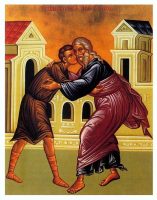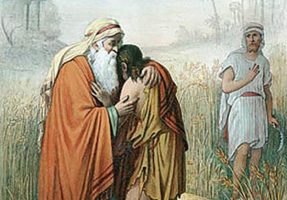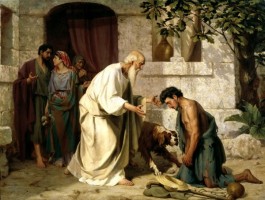It’s human nature to want a just world. Indeed, our view of justice is Lady Justice who is blindfolded, showing that she doesn’t pursue any special interest. Everyone is to be treated equally. She enforces her decrees with a sword in one hand, and, with the other hand, she shows that her decisions are upright. But, scripture challenges our views of justice, and the parable of the Prodigal Son reminds us that, if anything, our God is purposely unjust. (Reflections on the Sunday of the Prodigal Son).
—
Our craving for Justice
We live in a world that is much different than worlds that have come before us. We consume news and social media by the minute…no, by the second.
In 1492 Columbus sailed the ocean blue, and Europeans had to wait years to hear what happened. We, though, get real-time updates on almost any event around the world.
Along with this new media, comes a renewed interest in justice. Facebook, Twitter, YouTube, and Instagram broadcast injustices from around the world into our homes, and we’re enraged.
In just the last few years, we’ve seen many different social justice movements: from #MeToo advocating for women’s rights, to #BlackLivesMatter pursuing redemption for the African American community. Occupy Wall Street seeks to correct an imbalance between the “Have” and “Have-Nots,” while the March For Life movement sees thousands of people giving a voice to the unborn. There is no shortage of justice movements.
And our embrace, or even our non-embrace, of these movements depends on how we see the rules. Are these people being treated justly? Or have they broken the rules? Are they good guys or bad buys? Do we following the rules supporting them, or should we protest against rules that shouldn’t have been in the first place?
An Unjust Son is Welcomed Home
These questions about justice are tough ones. In fact, I imagine similar questions were on the mind of the older son, as he watched his father unjustly embrace the younger, disobedient son.
When the younger son first asked for his inheritance early, it was a grave insult to the father. He was, essentially, proclaiming that he felt his father should be dead. He couldn’t wait to get his hands on his father’s wealth, but the only thing that stood in his way was his father.
Miraculously, the father surprises everyone by agreeing with the younger son, he divides his living among his sons. Taking his inheritance, the son leaves, forever changing is identity.
In the ancient Middle East, one’s identity was deeply tied to one’s family. You were known as the son of, or the daughter of, so-and-so. When the younger son leaves, not only had he insulted his father by first taking his inheritance, but he had also broken household solidarity. No longer would the younger son be a part of this family. No longer would he be known as the son of this father.
When a famine comes, the younger son’s act of exclusion leaves him destitute. Without family support, he has no one to fall back on. His only recourse is to cleave to foreign pigs.
It’s at this moment that he remembers. He recalls what it meant to be in a relationship, what it meant to be a son.
And coming to himself he said, ‘How many of my father’s hired men are overflowing with bread, but I am here perishing from famine. I will get up and go to my father, and I will say to him, “I have sinned against heaven and before you, I am no longer worthy to be called your son.”’
However, his plan is thwarted. Thinking he could return, confess his sins, and be instated as a servant, a non-son, his father runs out to embrace him.
And while he was yet far away his father saw him and was inwardly moved with pity, and ran and fell upon his neck and kissed him fervently.
The act of embrace preceded the younger son’s confession. This created a new identity for the younger son. The father hadn’t let the younger son out of his heart. Only after putting a ring on the younger son’s finger, putting a robe around him, and requesting that a fattened calf be slaughtered does the father proclaim,
“…let us sit and have good cheer, because this son of mine was dead and has come to life again…”
No longer is this the younger son, but the son who is alive again.
Was the Father’s Embrace Just?
At this point, we’re asking ourselves the same questions that the older son is asking himself: is this just?
The older brother had been a good son but never had his father thanked him with a feast. It seems the basic rules have been broken. Miroslav Volf, in his brilliant book, Exclusion and Embrace, sums up the older brother’s thoughts poignantly.
The one who works deserves more recognition than the one who squanders; celebrating the squander is squandering. The one who obeys where obedience is due deserves more honor than the one who irresponsibility breaks commands; honoring the irresponsible is irresponsible. The one who remains faithful should be treated better than the one who excludes the others; preference for the excluding one is tacit exclusion of the faithful one. When squandering becomes better than working and the breach of relationships better than faithfulness, justice will be perverted and the household will fall apart… (pg. 162)
The older brother wants justice, blind justice. The younger son had wished his father dead, excluded himself from the family, and then squandered everything. It is not right that he should be welcomed back as a “son-alive-again.” Maybe it’s OK to welcome him as a hired servant, but not a son.
God Gives Us a New Model for Justice
Yet this father, an image of our Heavenly Father, shows us that blind justice is not how God operates. Following the rules can often lead to more damage: encouraging self-righteousness – like the Pharisee from last week – or the demonization of others.
For God, “relationship” is more important than moral performance. Scripture is full of these sorts of images: God marking Cain for safety even after the murder of his brother; the embrace of Jacob and Esau; God continuing to lead the Hebrews even after they worshiped the golden calf; God’s faithfulness to his covenant with Israel despite their continued disobedience; or even Jesus, the Anointed King, continually embracing tax-collectors, prostitutes, adulterers, Gentiles, and sinners.
The “son-alive-again” may not get a second inheritance – the father does declare that all he has belongs to the older son now – but the Prodigal is embraced as a son, not a hired servant.
Our Heavenly Father is guided by love, not the scale of Blind Justice. Whereas Justice doesn’t pursue special interests, God’s special interest is his love for us. He meets us where we are and embraces us for who we are. This is the image of Jesus on the cross, his arms open comforting all those who come to him.
Through Jesus’s embrace, a new relationship is realized. We become a “son-alive-again.” And Christ’s embrace causes us to confess. Like the younger son, we too have missed the mark. Like him, we too need to “come to ourselves,” leave our reckless ways behind and run back to the Father, who has never let us leave the mind of his heart.
This Lent, let us pray that our Father’s embrace creates a new transformative relationship so that we may too may rise in the Resurrection.




















